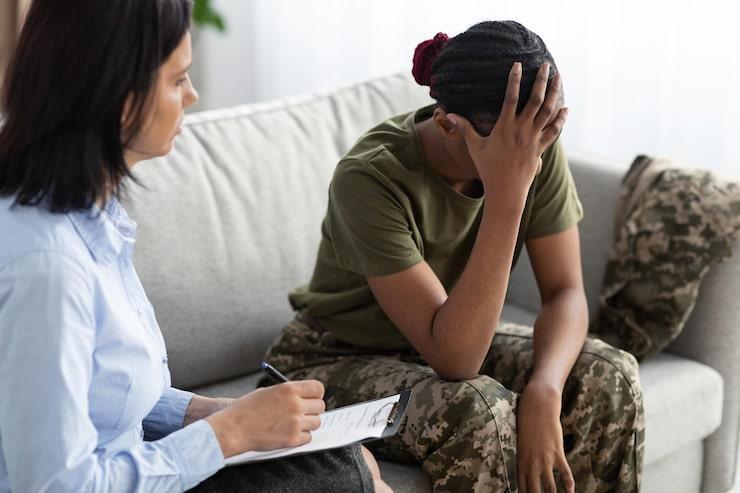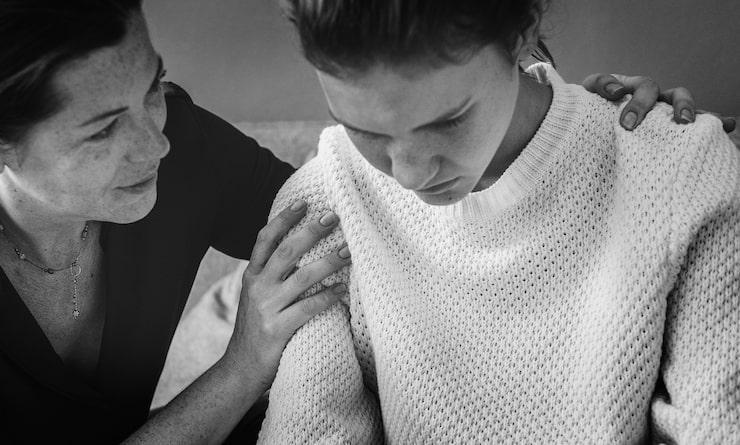
female soldier getting therapy
Posttraumatic stress disorder (PTSD) is a mental health condition that can develop in individuals who have gone through or witnessed traumatic events. These events are often perceived as emotionally as well as physically damaging, even threatening to one's life. Examples of such events include various forms of abuse, such as physical, sexual, emotional, and natural disasters, severe accidents, combat exposure, domestic violence, and significant medical issues that leave behind a lasting effect on the patient's psyche. However, it's important to note that not everyone who experiences trauma will develop PTSD.
The symptoms of PTSD are divided into four main categories. They cover the different dimensions of the things that a person with PTSD might face due to their presence. These symptoms include:
These unwanted memories appear in the form of hallucinations, flashbacks, and nightmares of the trauma that caused them to have PTSD. This makes them relive the incident
repeatedly, making them suffer from mental torture.
People usually go out of their way to avoid being reminded of a particular event that carries horrific memories. They do this by avoiding certain places, staying away from doing activities they used to enjoy, and refusing to address the trauma at all, sometimes not even mentioning it.
These changes consist of problems relating to others, trouble falling asleep or staying asleep, irritability, acting differently than usual, more frequent outbursts of anger, taking risky decisions, being easily startled, and even nausea and diarrhoea.
The way a person sees themselves and the world around them changes and becomes negative after the traumatic event. They might blame themselves for the event, think of themselves as weak or worthless, feel hopeless regarding a future, be more suspicious of others, and have difficulties experiencing joy and enjoyment.

sad girl sitting curled up on the floor
Not everyone who experiences trauma ends up with PTSD; this is because everyone experiences trauma in their unique way and hence differs in processing it too. The type of help, support, and overall understanding you get from people around you after the trauma influences whether a person gets PTSD or not.
Some possible causes linked to PTSD are:
PTSD affects a person's quality of life intensely. This may even lead to them developing certain damaging conditions. These conditions are:

woman comforting her friend
Some ways to help someone with PTSD are:
Posttraumatic stress disorder (PTSD) is a mental health condition that can develop in individuals who have gone through or witnessed traumatic events.
There are a lot of causes for someone getting PTSD, usually it involves a major traumatic event and a lack of empathetic treatment from those around them.
Symptoms of PTSD include unwanted memories, avoidance, change in physical and emotional reactions, and more.
Helping someone with PTSD is significantly easier if you are willing to be patient by being a good listener and respecting their boundaries.
It can have effects that damage their daily function and overall quality of life. These include developing depression, eating disorders, and being drawn to alcohol and drug abuse.
We offer expert care across key specialties, including Medicine, Cardiology, Orthopaedics, ENT, Gynaecology, and more—delivering trusted treatment under one roof.
Prakash Hospital Pvt. Ltd. is a 100 bedded NABH NABL accredited multispecialty hospital along with a center of trauma and orthopedics. We are in the service of society since 2001.
OUR SPECIALITIES
Contact Us
D – 12A, 12B, Sector-33, G. B. Nagar, Noida, Uttar Pradesh 201301
+91-8826000033

© 2025 All rights reserved.
Designed and Developed by Zarle Infotech